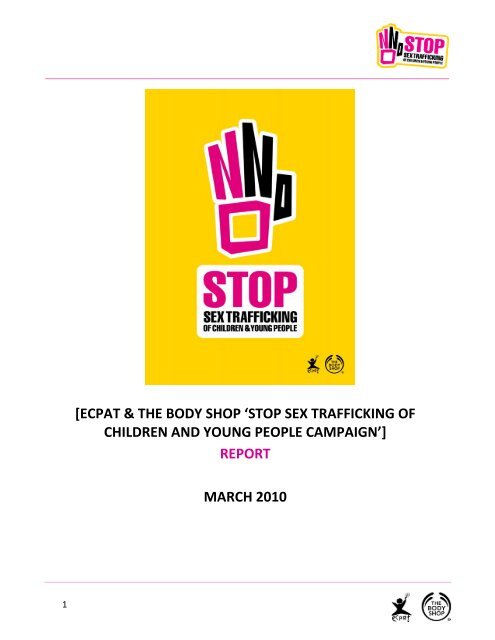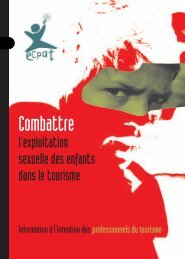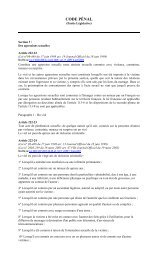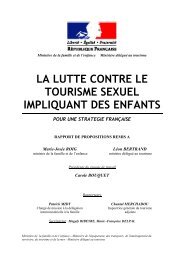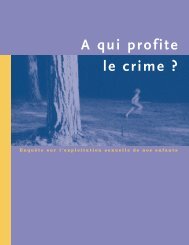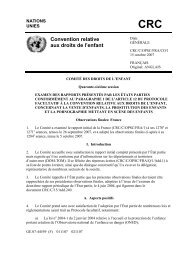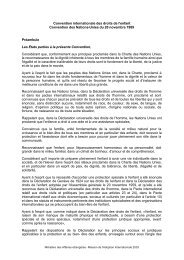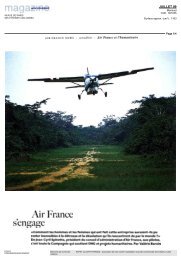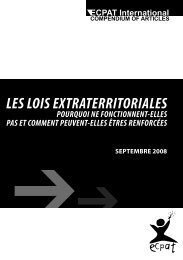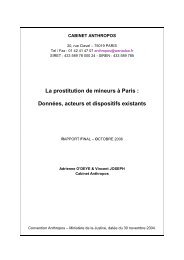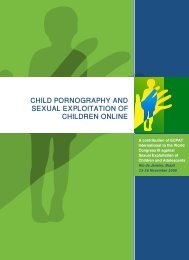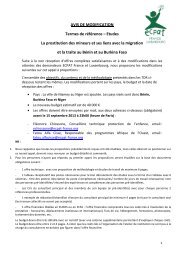[ecpat & the body shop 'stop sex trafficking of children ... - Ecpat France
[ecpat & the body shop 'stop sex trafficking of children ... - Ecpat France
[ecpat & the body shop 'stop sex trafficking of children ... - Ecpat France
Create successful ePaper yourself
Turn your PDF publications into a flip-book with our unique Google optimized e-Paper software.
[ECPAT & THE BODY SHOP ‘STOP SEX TRAFFICKING OF<br />
CHILDREN AND YOUNG PEOPLE CAMPAIGN’]<br />
REPORT<br />
MARCH 2010<br />
1
REPORT CONTENTS<br />
1. INTRODUCTION p. 3<br />
2. PROGRESS REPORT FOR YEAR ONE p. 4<br />
A. CAMPAIGN AWARENESS RAISING ACTIVITIES p. 4<br />
B. ANTI‐CHILD TRAFFICKING INITIATIVES SUPPORTED FROM THE SALE<br />
OF THE ‘SOFT HANDS KIND HEART HAND CREAM’ p. 7<br />
C. PROGRESS CARDS p. 11<br />
3. FUTURE PLANS: TOWARDS YEAR TWO & THREE p. 12<br />
2
1. INTRODUCTION<br />
The ‘Stop Sex Trafficking <strong>of</strong> Children and Young People Campaign’ launched in partnership between The Body Shop and<br />
ECPAT seeks to inspire permanent change to streng<strong>the</strong>n <strong>the</strong> protection <strong>of</strong>fered to <strong>children</strong> and young people and<br />
guarantee <strong>the</strong>ir rights to be protected from all forms <strong>of</strong> exploitation, including <strong>trafficking</strong> for <strong>sex</strong>ual purposes. As a global<br />
network operating in over 75 countries working specifically against <strong>the</strong> commercial <strong>sex</strong>ual exploitation <strong>of</strong> <strong>children</strong>, ECPAT<br />
International believes that collaboration between <strong>the</strong> private sector and civil society is crucial in successfully combating<br />
such abuses against <strong>children</strong>. The Body Shop, <strong>the</strong> original natural and ethical beauty company, has a demonstrated<br />
record <strong>of</strong> commitment <strong>of</strong> support to many important social and environmental issues. Thus, this unique global<br />
partnership demonstrates how a company can use its position in society to take active and powerful steps to contribute<br />
towards improving <strong>the</strong> lives <strong>of</strong> millions <strong>of</strong> <strong>children</strong> worldwide.<br />
In line with <strong>the</strong> vision <strong>of</strong> <strong>the</strong> Clinton Global Initiative (CGI) to streng<strong>the</strong>n <strong>the</strong> cooperation between stakeholders to<br />
address <strong>the</strong> world’s challenges and work towards finding solutions, The Body Shop and ECPAT strongly believe that by<br />
working toge<strong>the</strong>r <strong>the</strong>y can make a difference in stopping <strong>the</strong> <strong>trafficking</strong> <strong>of</strong> <strong>children</strong> for <strong>sex</strong>ual purposes through <strong>the</strong><br />
implementation <strong>of</strong> <strong>the</strong> innovative ‘Stop Sex Trafficking <strong>of</strong> Children and Young People Campaign.’<br />
Through this three year campaign (2009 – 2011), The Body Shop and<br />
ECPAT will aim to provide immediate relief to child victims with funds<br />
raised, but also create long‐term changes through awareness raising<br />
with <strong>the</strong> public and by lobbying decision makers to streng<strong>the</strong>n<br />
concerted action against child <strong>trafficking</strong> for <strong>sex</strong>ual purposes. At <strong>the</strong><br />
Fifth Annual CGI meeting in September 2009, President Clinton singledout<br />
The Body Shop and ECPAT’s campaign to Stop Sex Trafficking <strong>of</strong><br />
Children and Young People as 'an exemplary approach to addressing a<br />
specific global challenge.’<br />
The campaign is guided by <strong>the</strong> 2008 Rio de Janeiro Declaration and Call<br />
for Action to Prevent and Stop Sexual Exploitation <strong>of</strong> Children (<strong>the</strong> outcome document <strong>of</strong> <strong>the</strong> World Congress III against<br />
Sexual Exploitation <strong>of</strong> Children and Adolescents held in November 2008) which has inspired <strong>the</strong> three main advocacy<br />
goals <strong>of</strong> <strong>the</strong> campaign are:<br />
1. Community‐base prevention programmes to stop child <strong>trafficking</strong> are reaching at‐risk populations;<br />
2. International legal standards for protecting <strong>children</strong> from <strong>trafficking</strong> have been incorporated into <strong>the</strong> national<br />
legal framework; and<br />
3. Specialised government services for child victims <strong>of</strong> <strong>trafficking</strong> are integrated into national policies.<br />
The progress made by states towards fulfilling <strong>the</strong>se goals will be monitored by ECPAT and The Body Shop using an<br />
innovative tool, called <strong>the</strong> ‘Progress Card.’ A Progress Card will be available for each country individually to allow all those<br />
interested in <strong>the</strong> countries’ action to see <strong>the</strong> specific actions that are being taken at <strong>the</strong> national level to realize <strong>the</strong> goals<br />
<strong>of</strong> <strong>the</strong> campaign. In this way, <strong>the</strong> Progress Cards will assess a state’s progress and summarise <strong>the</strong> level <strong>of</strong> achievement<br />
towards twelve indicators that have been selected, as indicative <strong>of</strong> significant actions and steps that when taken, can<br />
contribute to <strong>the</strong> realisation <strong>of</strong> <strong>the</strong> main goals identified in <strong>the</strong> campaign. As <strong>the</strong> campaign heads into 2010 <strong>the</strong> focus will<br />
shift more emphasis towards advocacy activities for <strong>the</strong> three goals, including, national campaign petitions in each<br />
country and <strong>the</strong> fur<strong>the</strong>r implementation <strong>of</strong> anti‐child <strong>trafficking</strong> initiatives and projects funded through <strong>the</strong> initial sale <strong>of</strong><br />
<strong>the</strong> ‘S<strong>of</strong>t Hands, Kind Heart Hand Cream.’<br />
3
2. PROGRESS REPORT FOR YEAR ONE<br />
A. CAMPAIGN AWARENESS RAISING ACTIVITIES<br />
Raising awareness among <strong>the</strong> public on social issues is a key goal <strong>of</strong> <strong>the</strong> campaign partnership which unites <strong>the</strong> partners’<br />
experiences <strong>of</strong> implementing campaigns within <strong>the</strong>ir respective sectors. ECPAT began its work launching a campaign<br />
against <strong>the</strong> prostitution <strong>of</strong> <strong>children</strong> in Asian tourism in <strong>the</strong> early 1990’s and has been advocating among world leaders and<br />
relevant stakeholders on <strong>the</strong> issue <strong>of</strong> commercial <strong>sex</strong>ual exploitation <strong>of</strong> <strong>children</strong> keeping <strong>the</strong> commitment for action to<br />
combat <strong>the</strong>se violations alive and visible in <strong>the</strong> global agenda through <strong>the</strong> processes that has led to three World<br />
Congress, including <strong>the</strong> most recent one at <strong>the</strong> close <strong>of</strong> 2008. The ECPAT network has extensive experience in concrete<br />
work against child <strong>trafficking</strong> for <strong>sex</strong>ual purposes and on advocacy.<br />
The Body Shop runs its’ business based on <strong>the</strong> premise that <strong>the</strong> company can be both pr<strong>of</strong>itable and also work towards<br />
positive social and environmental changes. With more than 2,500 stores in 64 countries, The Body Shop has<br />
demonstrated from past campaigns (such as banning animal testing and raising awareness and inspiring legislative<br />
against domestic violence) that <strong>the</strong>y can reach millions <strong>of</strong> customers to engage <strong>the</strong>m on important social and<br />
environmental issues. The ‘Stop Sex Trafficking <strong>of</strong> Children and Young People Campaign’ aims to raise awareness and<br />
inspire people to take action to create lasting positive outcomes in preventing child <strong>trafficking</strong> and <strong>the</strong> <strong>sex</strong>ual exploitation<br />
<strong>of</strong> <strong>children</strong>.<br />
The ECPAT and The Body Shop ‘Stop Sex Trafficking <strong>of</strong> Children<br />
and Young People Campaign’ launched in August 2009 with<br />
<strong>the</strong> release <strong>of</strong> <strong>the</strong> campaign base‐line report in Bangkok,<br />
Thailand. The report, Their Protection is in Our Hands – <strong>the</strong><br />
State <strong>of</strong> Global Child Trafficking for Sexual Purposes 1 ,<br />
reiterates that <strong>the</strong> <strong>trafficking</strong> <strong>of</strong> <strong>children</strong> and young people for<br />
<strong>sex</strong>ual purposes in many countries is increasing and<br />
governments need to do more to tackle <strong>the</strong> problems and<br />
protect <strong>children</strong> and young people. Key findings <strong>of</strong> <strong>the</strong> report<br />
include: <strong>the</strong> current global recession is increasing <strong>children</strong>’s<br />
vulnerability towards being trafficked; increase <strong>of</strong><br />
internal/domestic <strong>trafficking</strong> <strong>of</strong> <strong>children</strong> within <strong>the</strong>ir own<br />
country; <strong>the</strong> existence <strong>of</strong> demand and lucrative pr<strong>of</strong>its will<br />
continue to generate <strong>sex</strong> <strong>trafficking</strong> <strong>of</strong> <strong>children</strong>; traffickers are<br />
likely to come from <strong>the</strong> same ethnic/national background as victims; and a list <strong>of</strong> factors that heightens child <strong>trafficking</strong>.<br />
A key note speaker at <strong>the</strong> launch was Ms Najat M'jid Maalla, UN‐Special Rapporteur on <strong>the</strong> sale <strong>of</strong> <strong>children</strong>, child<br />
prostitution and child pornography, who committed to sharing <strong>the</strong> Report’s findings with <strong>the</strong> Committee on <strong>the</strong> Rights <strong>of</strong><br />
<strong>the</strong> Child and o<strong>the</strong>r UN Rapporteurs and expressed her commitment to continue to support <strong>the</strong> campaign. The launch<br />
was attended by over 100 media and representatives <strong>of</strong> NGOs, UN agencies and government partners working to<br />
promote <strong>children</strong>’s rights, and resulted in 30 international and national media reports 2 . The campaign will be<br />
implemented in 43 countries where ECPAT member groups or partners toge<strong>the</strong>r with <strong>the</strong> local The Body Shop markets, as<br />
well as in o<strong>the</strong>r countries where supporting organizations are interested to extend <strong>the</strong> message and work <strong>of</strong> <strong>the</strong><br />
campaign.<br />
Following <strong>the</strong> global launch <strong>of</strong> <strong>the</strong> campaign, <strong>the</strong> local partners implementing <strong>the</strong> campaign hosted <strong>the</strong>ir own national<br />
launches to kick start <strong>the</strong> awareness raising activities and <strong>the</strong> sales <strong>of</strong> <strong>the</strong> specially created ‘S<strong>of</strong>t Hands Kind Heart Hand<br />
Cream’ sold with all pr<strong>of</strong>its donated to campaign; <strong>the</strong>re were over 25 national launches. As <strong>the</strong> goal <strong>of</strong> year one <strong>of</strong> <strong>the</strong><br />
1 The <strong>of</strong>ficial campaign base‐line report, Their Protection is in Our Hands ‐ The State <strong>of</strong> Global Child Trafficking for Sexual Purposes, is available for free<br />
at: http://www.<strong>ecpat</strong>.net/EI/Publications/Trafficking/Full_Report_Global_Child_Trafficking_for_Sexual_Purposes.pdf<br />
2<br />
A recorded version <strong>of</strong> <strong>the</strong> press conference at <strong>the</strong> campaign’s launch can be viewed at www.ustream.tv/channel/<strong>ecpat</strong>‐<strong>the</strong><strong>body</strong><strong>shop</strong>.<br />
4
campaign was to focus on awareness raising on <strong>the</strong> issue <strong>of</strong> child <strong>sex</strong> <strong>trafficking</strong> and <strong>the</strong> campaign, <strong>the</strong> majority <strong>of</strong><br />
activities implemented by ECPAT groups and <strong>the</strong> local The Body Shop reflected this. Many groups held press conferences<br />
and training work<strong>shop</strong>s on <strong>the</strong> issue <strong>of</strong> child <strong>sex</strong> <strong>trafficking</strong>; provided information to <strong>the</strong> public via campaign brochures,<br />
<strong>the</strong> base‐line report and videos; promoted <strong>the</strong> ‘S<strong>of</strong>t Hands Kind Heart Hand Cream’ in magazines and news articles;<br />
enlisted <strong>the</strong> support <strong>of</strong> important government <strong>of</strong>ficials and celebrities; as well as involving youth in implementing various<br />
campaign activities. The aim was to improve <strong>the</strong> public’s understanding <strong>of</strong> child <strong>sex</strong> <strong>trafficking</strong>, explain <strong>the</strong> campaign’s<br />
objectives and recruit supporters. In summary, <strong>the</strong> campaign awareness raising activities were successful, with extensive<br />
media coverage and positive response from <strong>the</strong> public. Many ECPAT groups have reported an increase in inquires for<br />
information on <strong>the</strong> issue <strong>of</strong> child <strong>trafficking</strong> or inquires to volunteer from <strong>the</strong> public and to run news stories from <strong>the</strong><br />
media.<br />
Some <strong>of</strong> <strong>the</strong> highlights from selected launches are presented below 3 :<br />
New Zealand<br />
In August 2009, ECPAT New Zealand and The Body Shop New Zealand, in<br />
conjunction with <strong>the</strong> campaign’s launch also opened a new Internet ECPAT<br />
Child Alert Hotline for reporting Internet websites containing child<br />
pornography. The Hotline provides a browser plug‐in through a quick, safe<br />
download that features <strong>the</strong> ECPAT Child Alert icon. If a suspect website is<br />
viewed, <strong>the</strong> computer user simply clicks on <strong>the</strong> Child ALERT icon and <strong>the</strong><br />
screen will disappear. At The Body Shop market launches, <strong>children</strong> wearing<br />
masks and placards distributed brochures and CDs containing <strong>the</strong> Hotline<br />
s<strong>of</strong>tware. The Hotline CDs will also be <strong>of</strong>fered at no cost to <strong>the</strong> public<br />
through The Body Shop stores.<br />
South Korea<br />
A different approach was taken by <strong>the</strong> team in South Korea, which<br />
wanted to target <strong>children</strong> and young people directly. Thus, a TV<br />
advertisement promoting <strong>the</strong> ‘Stop Sex Trafficking <strong>of</strong> Children and<br />
Young People Campaign’ was created, featuring <strong>the</strong> very popular<br />
music group 2PM as <strong>the</strong> campaign’s celebrity ambassador 4 . The<br />
advertisement was aired on Korean television for a period <strong>of</strong> a<br />
month with overwhelming success and response from <strong>the</strong> public.<br />
In August 2009, on <strong>the</strong> <strong>of</strong>ficial launch day <strong>of</strong> <strong>the</strong> campaign, long<br />
lines <strong>of</strong> customers, including youths, appeared at <strong>the</strong> Body Shop<br />
stores to support <strong>the</strong> campaign.<br />
United Kingdom<br />
In <strong>the</strong> United Kingdom, The Body Shop UK and ECPAT UK launched <strong>the</strong> campaign at a press conference at Kings Cross St.<br />
Pancras railway station in London. At <strong>the</strong> event in August 2009, <strong>the</strong> findings from The Body Shop UK consumer survey,<br />
were presented which revealed over a third <strong>of</strong> all Britons thought that <strong>children</strong> were only trafficked in o<strong>the</strong>r countries –<br />
not to <strong>the</strong> UK. The Metropolitan Police Paladin Team provided information from <strong>the</strong> policing perspective and spoke about<br />
how <strong>the</strong> campaign will raise awareness <strong>of</strong> <strong>the</strong> issue and help stop child <strong>trafficking</strong>. A short DVD, made by <strong>the</strong> ECPAT UK<br />
Youth Group, was shown stating what young people want this campaign to achieve and what <strong>the</strong> UK Government need to<br />
do to ensure child victims <strong>of</strong> <strong>trafficking</strong> are protected and supported.<br />
3 More information on <strong>the</strong> campaign launches can be found on <strong>the</strong> <strong>of</strong>ficial campaign website at http://www.<strong>the</strong><strong>body</strong><strong>shop</strong>.com/_en/_ww/valuescampaigns/<strong>trafficking</strong>.aspx?<br />
and <strong>the</strong> ECPAT International website at http://www.<strong>ecpat</strong>.net/EI/index.asp<br />
4 The TV advertisement featuring 2 PM for South Korea’s implementation <strong>of</strong> <strong>the</strong> campaign can be seen at: http://www.youtube.com/watch?v=0Hkk0‐<br />
a3p14&eurl=http%3A%2F%2Fwww.2pm‐online.com%2F&feature=player_embedded (last accessed on February 24, 2010).<br />
5
Thailand<br />
On 26 August 2009, The Body Shop and ECPAT International launched<br />
<strong>the</strong> ‘Stop Sex Trafficking <strong>of</strong> Children & Young People Campaign’ in<br />
Thailand. The launch was held at Central World, one <strong>of</strong> <strong>the</strong> most popular<br />
<strong>shop</strong>ping centres in Bangkok. The event started with a showing <strong>of</strong> Thai<br />
celebrities discussing <strong>the</strong> issue <strong>of</strong> child <strong>sex</strong> <strong>trafficking</strong> and support for <strong>the</strong><br />
campaign with several Thai celebrities also in attendance at <strong>the</strong> event.<br />
After brief summary <strong>of</strong> <strong>the</strong> campaign, <strong>the</strong>re was a panel discussion on<br />
how child <strong>sex</strong> <strong>trafficking</strong> occurs in Thailand, its scopes and <strong>the</strong><br />
campaign’s importance. In addition, it was announced at <strong>the</strong> event that<br />
popular Thai mobile phone network provider DTAC will send out SMS<br />
messages about <strong>the</strong> campaign and <strong>the</strong> hotline reporting number for<br />
reporting possible cases <strong>of</strong> child <strong>trafficking</strong> to all <strong>the</strong>ir post pay customers. These messages will reach millions <strong>of</strong> people<br />
across Thailand. In addition, MTV is supporting <strong>the</strong> campaign by re‐airing <strong>the</strong> pro‐bono video that started <strong>the</strong> event on<br />
MTV Thailand and have <strong>the</strong>ir VJ promote <strong>the</strong> campaign on popular shows. Also at <strong>the</strong> event, The Body Shop staff<br />
promoted and sold <strong>the</strong> ‘S<strong>of</strong>t Hands Kind Heart Hand Cream’ and ran fun activities for <strong>the</strong> public.<br />
Japan<br />
In Japan, The Body Shop and ECPAT Stop Japan launched <strong>the</strong> Stop Trafficking <strong>of</strong> Children<br />
& Young People campaign in Tokyo on August 21 2009 with three media events at The<br />
Body Shop’s new store in Shinjuku. At <strong>the</strong> press conference, information on <strong>the</strong> campaign<br />
and <strong>the</strong> issue <strong>of</strong> child <strong>trafficking</strong> was provided to <strong>the</strong> public. The first public awareness<br />
raising event was <strong>the</strong> “No‐No Walk” that was held on <strong>the</strong> 19 th <strong>of</strong> September in Shinjuku<br />
area <strong>of</strong> Tokyo. Employees from The Body Shop and NGO members joined in <strong>the</strong> event, a<br />
walk through Shinjuku with brochures and wearing <strong>the</strong> <strong>of</strong>ficial campaign T‐shirts. In<br />
addition, customers in Japan are asked to sign <strong>the</strong> “No No Book,” to show <strong>the</strong>ir support<br />
for <strong>the</strong> campaign. In <strong>the</strong> first ten days, <strong>the</strong>re were over 46,000 signatories from<br />
supporters (<strong>the</strong> target is to obtain 100,000 signatures). In addition, over 103,146 “No No”<br />
campaign stickers, which were very popular, were given out to customers. Ano<strong>the</strong>r<br />
special initiative <strong>of</strong> The Body Shop Japan is <strong>the</strong> donation boxes at various The Body Shop<br />
Stores to collect funds for ECPAT STOP Japan. In a short time from September 4 until<br />
October 29, <strong>the</strong> donation box alone has raised 1,581,504 yen; <strong>the</strong> highest amount <strong>of</strong><br />
money ever raised by The Body Shop campaigns in Japan.<br />
<strong>France</strong><br />
At The Body Shop’s Hôtel de Ville store in Paris on September 4, 2009, <strong>the</strong> ‘Stop Sex Trafficking <strong>of</strong> Children & Young<br />
People Campaign’ was <strong>of</strong>ficially launched in <strong>France</strong>. In addition to <strong>the</strong> distribution <strong>of</strong> <strong>the</strong> campaign leaflets to customers<br />
and passersby, an interactive corner was set up inside <strong>the</strong> store for <strong>the</strong> public to learn more about <strong>the</strong> issue <strong>of</strong> child <strong>sex</strong><br />
<strong>trafficking</strong> or have discussions with ECPAT and The Body Shop representatives. A popular activity at <strong>the</strong> event was hand<br />
massages by pr<strong>of</strong>essional masseurs for customers using <strong>the</strong> campaign product ‘S<strong>of</strong>t Hands Kind Heart Hand Cream’.<br />
Through <strong>the</strong> 42 national markets <strong>of</strong> The Body<br />
Shop worldwide, <strong>the</strong> campaign launches used a<br />
variety <strong>of</strong> innovative approaches to get<br />
awareness <strong>of</strong> <strong>the</strong> issue <strong>of</strong> child <strong>trafficking</strong> and<br />
<strong>the</strong> campaign out to <strong>the</strong> public. In <strong>the</strong> USA and<br />
Canada, public rallies were held; in <strong>the</strong><br />
Ne<strong>the</strong>rlands, <strong>the</strong> campaign was publicly<br />
endorsed by <strong>the</strong> State Secretary for Justice<br />
Albayrak; and in Singapore, a film screening was<br />
aired and <strong>the</strong> city metro buses were decorated in <strong>the</strong> campaign icon. Moreover, in India, awareness raising activities<br />
6
were set up on university campuses to involve students and in Pakistan, a media event was held in Mall <strong>of</strong> Lahore, with<br />
support from over 50 celebrities and socialites and many representatives from media and NGOs, including eight television<br />
stations.<br />
B. ANTI‐CHILD TRAFFICKING INITIATIVES SUPPORTED FROM THE SALE<br />
OF THE ‘SOFT HANDS KIND HEART HAND CREAM’<br />
For each country, <strong>the</strong> pr<strong>of</strong>its from <strong>the</strong> purchase <strong>of</strong> <strong>the</strong> campaign product, ‘S<strong>of</strong>t Hands Kind Heart<br />
Hand Cream’ will be donated to <strong>the</strong> ECPAT (with funds going to <strong>the</strong> ECPAT member in <strong>the</strong> country<br />
and £0.30 <strong>of</strong> <strong>the</strong> total sales given to ECPAT International for a global fund for work with ECPAT<br />
members in countries without The Body Shop). The ‘S<strong>of</strong>t Hands Kind Heart Hand Cream’ has sold<br />
400,000 units globally which is over 70% above expected sales targets. The money raised from this<br />
campaign is going directly into providing immediate support to <strong>children</strong> who have been affected by<br />
<strong>sex</strong> <strong>trafficking</strong> and towards prevention, awareness raising and o<strong>the</strong>r programmes targeted to<br />
<strong>children</strong> and young people and at‐risk communities.<br />
To date, ECPAT International has received approximately US$58,000 for a Global Fund which has started to support five<br />
separate projects against child <strong>trafficking</strong> and related forms <strong>of</strong> commercial <strong>sex</strong>ual exploitation <strong>of</strong> <strong>children</strong>:<br />
Commercial Sexual Exploitation <strong>of</strong> Boys in Latin America<br />
In early 2010, ECPAT International toge<strong>the</strong>r with its partner organizations<br />
in Chile, Colombia, Guatemala and Mexico started research to study <strong>the</strong><br />
commercial <strong>sex</strong>ual exploitation <strong>of</strong> boys (with a special focus on <strong>trafficking</strong>)<br />
in <strong>the</strong> four countries. Researchers from <strong>the</strong> four countries met with ECPAT<br />
International met at a planning meeting in Guatemala City in late January<br />
2010 to finalize <strong>the</strong> design and methodology for implementation <strong>of</strong> <strong>the</strong><br />
field work for <strong>the</strong> research project. The research to be carried out in<br />
Mexico and Guatemala will be based on semi‐structured interviews with<br />
<strong>children</strong> and o<strong>the</strong>r stakeholders and in‐depth interviews with key<br />
informants. Since no prior research has been done on this issue before in<br />
<strong>the</strong>se countries, direct observation documentation will also be used for <strong>the</strong><br />
data collection. Due to <strong>the</strong> high cost and safety implications, this method<br />
will be used in very specific locations. In <strong>the</strong> case <strong>of</strong> Mexico, <strong>the</strong> research will take place in Quintana Roo, where <strong>children</strong><br />
from Central America and <strong>the</strong> Caribbean enter Mexico on <strong>the</strong>ir way to <strong>the</strong> United States. In Guatemala, <strong>the</strong> city selected<br />
for <strong>the</strong> study is Tecun Uman, where <strong>children</strong> repatriated from US and Mexico are sent by <strong>the</strong> authorities. Meanwhile, in<br />
order to maximize <strong>the</strong> opportunity to reach affected boys that are already in shelters run by partner organisations, <strong>the</strong><br />
research in Chile and Colombia will focus on working with <strong>the</strong>se staff involved in providing direct support to boy victims in<br />
order to document case studies. The researchers will be able to get a deep understanding <strong>of</strong> <strong>the</strong> particularities <strong>of</strong> <strong>the</strong><br />
commercial <strong>sex</strong>ual exploitation <strong>of</strong> boys in <strong>the</strong>se countries, giving specific focus to child <strong>trafficking</strong> for <strong>sex</strong>ual purposes.<br />
7
The ECPAT Global Youth Partnership Project<br />
The ECPAT Global Youth Partnership Programme (Global YPP) is<br />
currently active in 16 countries across Africa, Asia, Eastern Europe &<br />
<strong>the</strong> CIS region and in Latin America. The Global YPP aims to empower<br />
young survivors <strong>of</strong> commercial <strong>sex</strong>ual exploitation and at‐risk youths<br />
by working with <strong>the</strong>m to build <strong>the</strong>ir self‐esteem and capacity through<br />
activities led by <strong>the</strong> young participants. In addition, <strong>the</strong> Global YPP<br />
aims to ensure <strong>children</strong>’s right to actively and meaningfully<br />
participate, particularly in social change and work against child exploitation. In each country, <strong>the</strong> Global YPP team<br />
includes a national coordinator, two youth motivators, peer supporters and youth advocates; <strong>the</strong> team implements <strong>the</strong><br />
following activities:<br />
• trainings and work<strong>shop</strong>s: on child rights (including <strong>the</strong> right to protection), leadership and life skills, running peer<br />
support programmes, working safely with <strong>children</strong>, and on working with <strong>the</strong> media;<br />
• peer to peer support programmes: led by youth at schools and shelters in areas with high risk <strong>of</strong> commercial<br />
<strong>sex</strong>ual exploitation <strong>of</strong> <strong>children</strong>, including child <strong>trafficking</strong>. With <strong>the</strong> support <strong>of</strong> <strong>the</strong>ir friends, <strong>children</strong> and youth<br />
can discuss <strong>the</strong>ir issues and concerns in a safe environment;<br />
• micro‐projects: designed and implemented by young people to lobby governments and to raise public awareness<br />
against <strong>sex</strong>ual exploitation <strong>of</strong> <strong>children</strong>;<br />
• Forum meetings: to form sustainable partnerships with key stakeholders from government departments, NGOs<br />
and local schools and shelters serving vulnerable <strong>children</strong>.<br />
As mentioned, micro‐projects are designed to enable disadvantage <strong>children</strong> and young people to develop and implement<br />
initiatives that <strong>the</strong>y <strong>the</strong>mselves have identified as priorities in combating child <strong>trafficking</strong> and commercial <strong>sex</strong>ual<br />
exploitation <strong>of</strong> <strong>children</strong>. The goals <strong>of</strong> micro projects are to encourage creative thinking among youth groups, inspiring<br />
<strong>the</strong>m to learn valuable leadership skills and self‐confidence while at <strong>the</strong> same time empowering <strong>the</strong>m to combat child<br />
<strong>trafficking</strong> and commercial <strong>sex</strong>ual exploitation <strong>of</strong> <strong>children</strong>. One example <strong>of</strong> a micro‐project is in Moldova, where Youth<br />
Motivators and <strong>the</strong> Peer Supporters implemented five micro‐projects within <strong>the</strong> local schools. The projects focused on<br />
encouraging wider participation <strong>of</strong> <strong>the</strong> students, in activities to learn more about <strong>children</strong>’s right to protection from<br />
<strong>sex</strong>ual exploitation and <strong>trafficking</strong>. The activities included seminars, training sessions and roundtable discussions on <strong>the</strong><br />
YPP, <strong>children</strong>’s rights and CSEC, which were all led and facilitated by youths involved in <strong>the</strong> project. They also held<br />
debates, art, literature and poetry competitions and even a radio program and operated a school blog which informed a<br />
wider audience about <strong>the</strong> YPP and <strong>the</strong> important role young people can play to protect <strong>the</strong>mselves against CSEC. About<br />
205 <strong>children</strong> directly benefitted from <strong>the</strong> micro‐projects through <strong>the</strong>ir participation and o<strong>the</strong>r 2,940 benefitted indirectly<br />
through <strong>the</strong> awareness raising and media activities.<br />
Ano<strong>the</strong>r YPP micro‐project was held recently in <strong>the</strong> Gambia, where <strong>the</strong> YPP Youths organized an extensive training for <strong>the</strong><br />
Peer Supporters in <strong>the</strong> Charles Jow Memorial Academy since <strong>the</strong>re were having difficulties in mobilising <strong>the</strong> wider<br />
<strong>children</strong> to conduct Peer Support sessions. During <strong>the</strong> training, <strong>the</strong> YPP youth had in‐depth discussions on <strong>the</strong> <strong>the</strong>matic<br />
issues such as child rights, <strong>sex</strong>ual exploitation and abuse, on peer support skills, and on supporting young people to<br />
carryout awareness raising activities and campaigns against <strong>sex</strong>ual exploitation and abuse <strong>of</strong> <strong>children</strong>. As a result <strong>the</strong><br />
<strong>children</strong> have formed a “YPP Club” though which <strong>the</strong> members can share opinions and experiences, design and<br />
implement future micro‐projects and collective work towards a safer environment for <strong>children</strong>. They were able to involve<br />
40 <strong>children</strong> directly and fur<strong>the</strong>r 600 indirectly through this activity. Lastly, in Chile, after <strong>the</strong> YPP Youth participated in a<br />
“Communications Work<strong>shop</strong>,” <strong>the</strong>y created a micro‐project that will allow <strong>the</strong> young people to report on <strong>the</strong> YPP<br />
activities, particularly on <strong>the</strong> activities from <strong>the</strong> peer support programmes, through audio visual technology such as<br />
cameras and audio recorders. This micro‐project allowed <strong>the</strong> youths to apply <strong>the</strong> knowledge that <strong>the</strong>y have gained from<br />
<strong>the</strong> work<strong>shop</strong> towards a new project benefitting <strong>the</strong> YPP youths. Once completed <strong>the</strong> youth plan to distribute <strong>the</strong>ir short<br />
‘documentaries’ on DVDs and CDs.<br />
8
A Child Protection Referral Mechanism: protect@<strong>ecpat</strong>.net<br />
People at <strong>the</strong> local level <strong>of</strong>ten see or become aware <strong>of</strong> child protection concerns<br />
but feel powerless to respond in any way. Due to <strong>the</strong> criminality and dangers<br />
involved in child <strong>trafficking</strong>, many witnesses to child exploitation are too scared<br />
to report to <strong>the</strong> police but are willing to do so anonymously to an NGO helpline.<br />
The presence and promotion <strong>of</strong> <strong>the</strong> ECPAT child protection reporting mechanism<br />
through <strong>the</strong> global campaign and website is facilitating concerned citizens to<br />
contact ECPAT International to report concern for a child. ECPAT International<br />
responds to <strong>the</strong>se reports within at least a 12 hour period, 7 days a week by<br />
ensuring <strong>the</strong>y are referred on to <strong>the</strong> most appropriate child protection and law<br />
enforcement agency. The ECPAT Child Protection Referral Mechanism management database tracks EI responses and is<br />
regularly updated to maintain <strong>the</strong> best contact lists <strong>of</strong> appropriate child protection agencies, law enforcement authorities<br />
and international and national help and hotlines. In <strong>the</strong> first two months <strong>of</strong> 2010, ECPAT International received 16<br />
separate actionable child protection reports (many o<strong>the</strong>rs lacked adequate information to allow follow up with law<br />
enforcement or o<strong>the</strong>r authorities) which resulted in 42 follow up communications to ensure a swift and adequate<br />
response.<br />
Research on Information Communication Technology and Child Sex Tourism<br />
ECPAT International has conducted a study on convergence in <strong>the</strong> use <strong>of</strong> information communication technologies (ICT)<br />
and tourism infrastructure to facilitate access to <strong>children</strong>, many <strong>of</strong> whom have been trafficked, for <strong>sex</strong>ual exploitation by<br />
travellers 5 . Preliminary findings shows that <strong>the</strong> combined ease to exchange <strong>of</strong> information and communication toge<strong>the</strong>r<br />
with <strong>the</strong> increasing shift toward self arranged travel to destinations where <strong>of</strong>ten <strong>the</strong> disparities between incoming guests<br />
and <strong>the</strong> local populations may be significantly pronounced, have added risk for <strong>children</strong> to <strong>sex</strong>ual exploitation in tourism.<br />
Many communication tools are being used not only to exchange information for accessing prospective victims, but also as<br />
attractions to bait and reward <strong>children</strong> for acts <strong>of</strong> exploitation. On <strong>the</strong> demand side, a clear trend was seen <strong>of</strong> exploiters’<br />
ready use <strong>of</strong> new communication tools and platforms in order to gain access to victims, to share information with likeminded<br />
individuals, and to keep victims involved with <strong>the</strong>m at a distance and over longer periods <strong>of</strong> time.<br />
Country Specific Initiatives<br />
This section contains information ga<strong>the</strong>red from some <strong>of</strong> <strong>the</strong> ECPAT groups that have begun to implement <strong>the</strong>ir anti‐child<br />
<strong>trafficking</strong> initiatives, utilising funds generated from <strong>the</strong> sales <strong>of</strong> <strong>the</strong> ‘S<strong>of</strong>t Hand Kind Heart Hand Cream’ donated by The<br />
Body Shop:<br />
• Australia: Child Wise, <strong>the</strong> ECPAT group in <strong>the</strong> country, has received approximately A$100,000 from <strong>the</strong> campaign thus<br />
far. While some <strong>of</strong> <strong>the</strong> funds will go towards future activities <strong>of</strong> <strong>the</strong> ‘Stop Sex Trafficking <strong>of</strong> Children & Young People<br />
Campaign’ in Australia, a larger part will go towards combating child <strong>trafficking</strong> in Cambodia. Specifically funds are<br />
going towards <strong>the</strong> following programmes: a school scholarship programme for vulnerable youths, training <strong>of</strong> teachers<br />
about child abuse and exploitation (including child <strong>trafficking</strong>), The Solidarity Can Stop Human Trafficking Project<br />
(pictorial engagement tool aimed at awareness raising with <strong>the</strong> local community), The First Step Project (raising<br />
awareness and improve care for boy victims <strong>of</strong> abuse and exploitation/<strong>trafficking</strong>), and towards rehabilitation<br />
(including <strong>the</strong>rapy, counselling and education) for girl victims through <strong>the</strong> Transitional Living Centre.<br />
• Austria: ECPAT Austria are utilising 30,000 Euros from <strong>the</strong> campaign towards lobbying <strong>the</strong> Austrian government for<br />
improvement in data collection on child <strong>trafficking</strong>; participation in a Task Force and relevant child <strong>trafficking</strong> network;<br />
conducting 3 or 4 multi‐stakeholder trainings for law enforcement <strong>of</strong>ficials, prosecutors and youth welfare on child<br />
<strong>trafficking</strong> and commercial <strong>sex</strong>ual exploitation <strong>of</strong> <strong>children</strong>; and towards future awareness raising activities related to<br />
phase two <strong>of</strong> <strong>the</strong> campaign;<br />
5 The research, “The Use <strong>of</strong> Information and Communication Technologies for <strong>the</strong> Sexual Exploitation <strong>of</strong> Children in Tourism in East and Sou<strong>the</strong>ast Asia”<br />
is available for download at <strong>the</strong> following link: http://www.<strong>ecpat</strong>.net/EI/Publications/Journals/ECPAT%20Journal_Mar2010_FINAL.pdf<br />
9
• Canada: The ECPAT group member Beyond Borders has received over Canadian $250,000 as <strong>of</strong> late February. The<br />
significant funds raised in Canada have allowed Beyond Borders to create for <strong>the</strong> first time ever two unique initiatives:<br />
Beyond Borders – Anita Roddick Fund for Sexually Trafficked Children and <strong>the</strong> Man‐to‐Man Campaign. Recently created,<br />
<strong>the</strong> Beyond Borders – Anita Roddick Fund will provide grants to child survivors <strong>of</strong> <strong>trafficking</strong> and <strong>the</strong> Man‐to‐Man<br />
campaign is focusing on <strong>the</strong> demand side <strong>of</strong> commercial <strong>sex</strong>ual exploitation and speaks directly to men, imploring <strong>the</strong>m<br />
to take action on <strong>the</strong> issue. Funds will also be used to support Beyond Borders to establish a presence in Quebec and<br />
o<strong>the</strong>r awareness raising activities;<br />
• Estonia: Tartu Child Support Centre will use <strong>the</strong> 1,700 Euros raised from <strong>the</strong> campaign for anti‐child <strong>sex</strong> tourism<br />
activities such as <strong>the</strong> EU “Offenders Beware” project and participation at <strong>the</strong> tourism fair for advocacy with <strong>the</strong> tourism<br />
industry and awareness raising with <strong>the</strong> general public;<br />
• Germany: As <strong>of</strong> January 2010, The Body Shop has transferred 77,760 Euros to ECPAT Germany as <strong>the</strong> funds raised.<br />
ECPAT Germany will utilise <strong>the</strong> funds towards multiple training work<strong>shop</strong> on streng<strong>the</strong>ning identification and support<br />
for trafficked <strong>children</strong> for stakeholders (law enforcement, judiciary <strong>of</strong>ficials, social and youth welfare, asylum<br />
institutions, counselling centres for <strong>sex</strong>ual abuse and <strong>trafficking</strong>, street <strong>children</strong> facilities etc). In addition, funds will be<br />
used towards work to advocate for <strong>the</strong> establishment <strong>of</strong> a national reporting system for child <strong>trafficking</strong> in Germany;<br />
• Hong Kong: With US$ 10,000 received from TBS Hong Kong, ECPAT International has carried out primary research <strong>of</strong><br />
secondary data and produced a Hong Kong Monitoring Report on <strong>the</strong> Status <strong>of</strong> Action against Commercial Sexual<br />
Exploitation <strong>of</strong> Children (Agenda for Action) 6 which provides information on <strong>the</strong> specific situation and an assessment <strong>of</strong><br />
<strong>the</strong> efforts made, and that are still needed, to protect <strong>children</strong> from <strong>sex</strong>ual exploitation and child <strong>trafficking</strong>. This<br />
cutting edge research report is based on <strong>the</strong> compilation <strong>of</strong> secondary data from verifiable and reputable sources and<br />
serves as a key advocacy document for relevant stakeholders and policy makers to promote more concerted action<br />
against <strong>sex</strong>ual exploitation <strong>of</strong> <strong>children</strong> in <strong>the</strong> territory;<br />
• Singapore: ECPAT International toge<strong>the</strong>r with The Body Shop, UNIFEM and HOME is conducting research on child<br />
<strong>trafficking</strong> for <strong>sex</strong>ual purposes in Singapore with US$28,000 funds raised in <strong>the</strong> city state. The final draft <strong>of</strong> <strong>the</strong><br />
literature review <strong>of</strong> secondary data was recently completed and shared among campaign project partners. A consultant<br />
and research assistants has been commissioned to conduct field level research with youth and trafficked victims in<br />
Singapore and in ‘source’ countries: Thailand, Philippines, Indonesia (Batam), China, Bangladesh and Vietnam. In<br />
Thailand, relevant information and cases <strong>of</strong> child survivors who were trafficked to Singapore for <strong>sex</strong>ual purposes has<br />
been collected from relevant governmental and non‐governmental organisations through careful interviews;<br />
• Taiwan: ECPAT Taiwan received approximately US$15,860.00 from <strong>the</strong> sales <strong>of</strong> <strong>the</strong> ‘S<strong>of</strong>t Hand Kind Heart Hand Cream’<br />
during <strong>the</strong> first phase <strong>of</strong> <strong>the</strong> campaign in Taiwan. The funds are going towards providing specialised care and<br />
reintegration services for child victims. Specifically, it goes towards improving shelter services and <strong>the</strong> provision <strong>of</strong><br />
vocational skills for <strong>the</strong> child victims during <strong>the</strong> rehabilitation process. Feedback on <strong>the</strong> impact <strong>of</strong> <strong>the</strong> ‘Stop Sex<br />
Trafficking <strong>of</strong> Children & Young People Campaign’ was that <strong>the</strong> customers who participated in activities and purchased<br />
<strong>the</strong> hand cream were able to learn about <strong>the</strong> issue <strong>of</strong> child <strong>trafficking</strong>;<br />
• Thailand: Approximately US$4,432 was raised from <strong>the</strong> sales <strong>of</strong> <strong>the</strong> hand cream<br />
within <strong>the</strong> country. ECPAT Foundation has received <strong>the</strong> money and will be utilising<br />
<strong>the</strong> funds to support <strong>the</strong> Global Youth Partnership Project’s implementation in<br />
Chiang Rai. Recently, <strong>the</strong> Peer Support team from <strong>the</strong> New Life Centre organised a<br />
training session and drama performance for 70 <strong>children</strong> in <strong>the</strong> Baan Doi Village, an<br />
area identified as a high risk area for child <strong>trafficking</strong>. The event was led by <strong>the</strong><br />
Peer Supporters and included a training session and a drama performance in <strong>the</strong><br />
local ethnic language (Akha) to build better understanding <strong>of</strong> <strong>the</strong> issues <strong>of</strong> child<br />
<strong>trafficking</strong> and child rights. The Peer Support Group from <strong>the</strong> YMCA shelter also<br />
6 This report will soon be available for download at: http://www.<strong>ecpat</strong>.net/EI/EI_publications.asp<br />
10
developed a training course for 54 local school students at <strong>the</strong> Baan Pin Primary School to educate <strong>the</strong>m on <strong>the</strong><br />
dangers <strong>of</strong> child <strong>trafficking</strong>. The YMCA group also held a drama performance for more than 300 people at <strong>the</strong> Baan<br />
Rompothai school to raise awareness on <strong>sex</strong>ual exploitation <strong>of</strong> <strong>children</strong> and <strong>trafficking</strong>;<br />
• United Kingdom: One <strong>of</strong> <strong>the</strong> biggest successes <strong>of</strong> <strong>the</strong> campaign, ECPAT UK has received over £200,000 from The Body<br />
Shop base on <strong>the</strong> sale <strong>of</strong> <strong>the</strong> hand cream alone. Projects that have begun with <strong>the</strong> related funds are a drama project by<br />
ECPAT UK’s youth group. The project is about <strong>the</strong>ir experience as child victims <strong>of</strong> <strong>trafficking</strong> in <strong>the</strong> UK but will be used<br />
as an awareness raising and advocacy tool for <strong>the</strong> general public. ECPAT UK has also started to plan a series <strong>of</strong><br />
comprehensive training for relevant stakeholders through a multi‐disciplinary approach to improve response and care<br />
towards child victims;<br />
• United States: Funds from <strong>the</strong> sales <strong>of</strong> <strong>the</strong> hand cream in <strong>the</strong> Unites States was approximately $268,000. ECPAT USA<br />
has started on following anti‐child <strong>trafficking</strong> initiatives: 1. lobbying for changes in state laws to protect child victims <strong>of</strong><br />
<strong>sex</strong>ual exploitation (specifically in Connecticut, Ohio and Minnesota) and to build support for a new federal law to fund<br />
six federal shelters through out <strong>the</strong> US specifically for child victims <strong>of</strong> <strong>sex</strong>ual exploitation and 2. providing specialised<br />
health care to child victims and building up <strong>the</strong> capacity <strong>of</strong> care givers at relevant organisations to improve services to<br />
child victims through trainings.<br />
C. PROGRESS CARDS<br />
An important advocacy component <strong>of</strong> <strong>the</strong> ‘Stop Sex Trafficking <strong>of</strong> Children and Young People Campaign’ is <strong>the</strong> country<br />
progress card system, which ECPAT and The Body Shop created to assess <strong>the</strong> progress <strong>of</strong> State’ action on specific<br />
commitments and promises to uphold <strong>the</strong> rights <strong>of</strong> <strong>the</strong> child to protection from <strong>sex</strong> <strong>trafficking</strong> and all forms <strong>of</strong><br />
commercial <strong>sex</strong>ual exploitation. In line with <strong>the</strong> 2008 Rio de Janeiro Declaration and Call for Action to Prevent and Stop<br />
Sexual Exploitation <strong>of</strong> Children from <strong>the</strong> World Congress III against Sexual Exploitation <strong>of</strong> Children and Adolescents, this<br />
innovative tool will provides readers with information on states’ action to combat child <strong>trafficking</strong>, specifically towards<br />
<strong>the</strong> three objects <strong>of</strong> <strong>the</strong> campaign:<br />
1. Community‐base prevention programmes to stop child <strong>trafficking</strong> are reaching at‐risk populations;<br />
2. International legal standards for protecting <strong>children</strong> from <strong>trafficking</strong> have been incorporated into <strong>the</strong> national<br />
legal framework; and<br />
3. Specialised government services for child victims <strong>of</strong> <strong>trafficking</strong> are integrated into national policies.<br />
In order to estimate <strong>the</strong> level <strong>of</strong> progress towards <strong>the</strong>se goals, twelve indicators (four for each campaign objectives) have<br />
been developed that provide some measure <strong>of</strong> overall achievement <strong>of</strong> <strong>the</strong> goals. The findings for each indicator are<br />
presented in a progress card matrix which provides a visual index <strong>of</strong> <strong>the</strong> level <strong>of</strong> action for each indicator by specific<br />
countries. Three colours are used to indicate a significant (GREEN), partial (YELLOW) or inadequate (RED) level <strong>of</strong> state<br />
action being implemented to achieve <strong>the</strong> goals.<br />
Example Country Progress Card Matrix<br />
Goal 1: Community‐base Prevention Progammes<br />
1.1 Prevention 1.2 Collaboration 1.3 Awareness raising 1.4 Teacher training<br />
Goal 2: Legal Framework<br />
2.1 Optional Protocol 2.2 Trafficking Protocol 2.3 National legislation 2.4 Special police units<br />
Goal 3: Specialised Services for Child Victims<br />
3.1 Helpline 3.2 Shelters 3.3 Medical services 3.4 Psychological counseling<br />
11
The data for <strong>the</strong> 43 Progress Cards (one per country directly implementing <strong>the</strong> campaign) was collected through various<br />
sources, focusing mainly on ECPAT’s experiences in monitoring progress on <strong>the</strong> implementation <strong>of</strong> <strong>the</strong> Agenda for Action<br />
against commercial <strong>sex</strong>ual exploitation <strong>of</strong> <strong>children</strong>. Data specifically on child <strong>trafficking</strong> (even more so for child <strong>sex</strong><br />
<strong>trafficking</strong>) was limited and data quality in each country uneven. ECPAT has taken every effort to minimise differences<br />
and work with its partners in each <strong>of</strong> <strong>the</strong> countries to identify optimal data sources. ECPAT member groups and partners<br />
played an important part in data verification and ‘scoring’ <strong>of</strong> each indicator.<br />
The benefits <strong>of</strong> <strong>the</strong> progress cards are <strong>the</strong> ability to provide straightforward and precise information on <strong>the</strong> level <strong>of</strong> state<br />
protection on child <strong>trafficking</strong>; as well as allow for comparisons based on uniform indicators and global analysis<br />
supported by aggregated information. Based upon <strong>the</strong> three key elements <strong>of</strong> a comprehensive strategy to combat child<br />
<strong>trafficking</strong> (prevention, protection and assistance), it also provides an overview <strong>of</strong> <strong>the</strong> main challenges and gaps in<br />
addressing child <strong>trafficking</strong>, while providing a useful baseline for informing campaigns and advocacy activities at national<br />
and global levels. Moreover, <strong>the</strong> progress cards provide recommendations for each country based on key international<br />
commitments (2008 Rio de Janeiro Declaration and Call for Action to Prevent and Stop Sexual Exploitation <strong>of</strong> Children, UN<br />
Convention on <strong>the</strong> Rights <strong>of</strong> <strong>the</strong> Child, Optional Protocol on <strong>the</strong> sale <strong>of</strong> <strong>children</strong> and UN Trafficking Protocol).<br />
The essence <strong>of</strong> <strong>the</strong>se progress cards is to provide clarity on government actions and <strong>the</strong>reby hold states accountable for<br />
policies and measures taken to meet <strong>the</strong>ir obligations towards <strong>children</strong>. The findings <strong>of</strong> <strong>the</strong> Progress Cards also become<br />
<strong>the</strong> basis for <strong>the</strong> campaign’s advocacy strategy starting with country petitions for year two. It summarises <strong>the</strong> situation <strong>of</strong><br />
child <strong>trafficking</strong> for <strong>the</strong> general public in an efficient way that enables <strong>the</strong>ir involvement in <strong>the</strong> campaign’s advocacy<br />
activities. It also provides a good ‘snapshot’ <strong>of</strong> <strong>the</strong> measures taken by states to combat child <strong>trafficking</strong>. The country<br />
progress card booklets will be available on‐line in July 2010 7 .<br />
3. FUTURE PLANS: TOWARDS YEAR TWO & THREE<br />
As <strong>the</strong> report has highlighted, <strong>the</strong> goal <strong>of</strong> <strong>the</strong> first year <strong>of</strong> <strong>the</strong> was to educate and raise awareness on <strong>the</strong> issue <strong>of</strong> child <strong>sex</strong><br />
<strong>trafficking</strong> and raise funds for <strong>the</strong> immediate relief brought to child victims through <strong>the</strong> sale <strong>of</strong> <strong>the</strong> hand cream. Since <strong>the</strong><br />
campaign’s launch in August 2009, hundreds <strong>of</strong> thousands <strong>of</strong> customers have demonstrated <strong>the</strong>ir commitment and<br />
interest in contributing to this campaign to secure a safer world for <strong>children</strong>. ECPAT and The Body Shop will continue to<br />
engage customers and <strong>the</strong> general public in creating a greater understanding <strong>of</strong> <strong>the</strong> issue and providing concrete and<br />
accessible information for each country, allowing <strong>the</strong> public to assess <strong>the</strong> situation and to open opportunities for public<br />
action against child <strong>sex</strong> <strong>trafficking</strong>.<br />
Year two and year three <strong>of</strong> <strong>the</strong> campaign will focus on advocating for changes in state policies and laws to protect<br />
<strong>children</strong> from child <strong>sex</strong> <strong>trafficking</strong>. As mentioned earlier, a key advocacy tool for <strong>the</strong> second year <strong>of</strong> <strong>the</strong> campaign is <strong>the</strong><br />
country progress cards. From <strong>the</strong>se booklets, ECPAT groups and The Body Shop will create a country‐specific petition to<br />
base its advocacy activities; in lobbying states to take specific action to combat child <strong>sex</strong> <strong>trafficking</strong>. As part <strong>of</strong> our<br />
commitment to inspire change, The Body Shop and ECPAT will be collecting signatures from supporters <strong>of</strong> <strong>the</strong> campaign<br />
in each country and will continue to mobilise active supporters to carry forward <strong>the</strong> message <strong>of</strong> <strong>the</strong> campaign.<br />
Fur<strong>the</strong>rmore, with <strong>the</strong> funds raised by <strong>the</strong> campaign, ECPAT will continue to implement anti‐child <strong>trafficking</strong> initiatives in<br />
<strong>the</strong> areas <strong>of</strong> prevention, protection and provision <strong>of</strong> care and rehabilitation in more locations and countries.<br />
ECPAT and The Body Shop believe that through customer participation in <strong>the</strong> campaign and awareness <strong>of</strong> <strong>the</strong> country<br />
progress cards, <strong>the</strong> public will be significantly more informed <strong>of</strong> <strong>the</strong> various issues related to child <strong>trafficking</strong> and able, in<br />
<strong>the</strong> long term, to call for comprehensive and integrated strategies to address <strong>the</strong> problem and prevent it ensuring that<br />
<strong>the</strong> rights <strong>of</strong> child victims will not be sidelined and <strong>the</strong>y will be able to better access a broad and inclusive range <strong>of</strong><br />
services for <strong>the</strong>ir support and recovery.<br />
7<br />
More in‐dept information about <strong>the</strong> campaign’s progress card can be found in this report: Monitoring State Progress to Protect Children & Young<br />
People from Trafficking for Sexual Purposes, is available for free at:<br />
http://www.<strong>ecpat</strong>.net/EI/Publications/Trafficking/Global_Monitoring_ProgressCards_FINAL.pdf<br />
12


